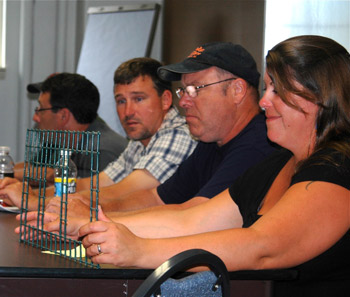LOBSTER COUNCIL MULLS FISHERY’S FUTURE
continued from Homepage

Maine Lobster Advisory Council’s first meeting in Hallowell to develop a Maine-specific Fisheries Management Plan. Lobster fishery sustainability is a stated central goal. One consideration addressed was escape vent size changes. Steve Cartwright photo
avoid a situation like Long Island Sound, where there are virtually no lobsters to catch after massive die-offs, and pesticides have shown up in the species.
DMR Commissioner Patrick Keliher commented that as work on the plan gets under way, “We will be going out to the public and taking in information. I’m certain some of these conversations will be difficult, and there will be disagreements.”
The council discussed lobster trap escape doors after Wilson raised the issue of large lobsters unable to escape ghost traps - those traps lost under water. Members and the audience commented on various sizes and placement of escape panels, and materials such as wood, plastic and wire. No consensus was reached but the matter will be revisited with more information from Wilson.
The council heard from fishermen who made a pitch for increasing the Swans Island trap limit from 550 traps to 600. Chairman Bob Baines of South Thomaston suggested bringing the issue to the Legislature’s Marine Resources Committee so that a bill could be drafted, and the council unanimously endorsed the proposed increase.
Marianne LaCroix, who has been acting director of the Maine Lobster Marketing Collaborative, updated the council on promotional efforts with chefs from around the country. She introduced Matt Jacobson, incoming executive director. He is a former Republican candidate for governor with a background in business consulting.
Council member Genevieve McDonald of Stonington volunteered to serve as representative to the Commercial Fishing Safety Council. She’s active with the Island Fishermen’s Wives Association, dedicated to safety at sea.
The council heard updates on possible random drug testing, whale protection regulations, green crab catching rules, Canadian lobstering, and lost trap tag replacements, an honor system.
The U.S. Army Corps of Engineers’ Searsport dredging project appears to be on hold, after environmentalists raised objections to the project. A Legislative task force is considering Ocean acidification, a global problem. Friendship lobsterman Richard Nelson serves on that panel.